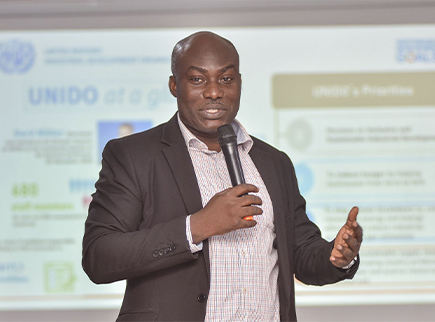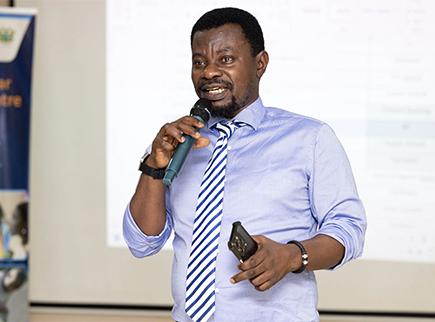Ghana is advancing its commitment to sustainable development through the Ghana Circular Economy Centre (GCEC) project, a key climate action initiative supporting the circular economy.
The GCEC promotes circular innovation, responsible production, and green job creation across key sectors.
Mr. Eric Gyenin, Country Project Coordinator, told the Ghana News Agency that the Centre seeks to support Ghana’s transition to a low-carbon and inclusive economy with particular focus on women, youth, and the informal sector.
The five-year project is being implemented by the United Nations Industrial Development Organization (UNIDO), in partnership with the Ministry of Environment, Science and Technology (MEST), with funding from Global Affairs Canada.
It targets inclusive circular business models in three priority sectors: textiles, plastics, agriculture, and agro-processing.
Mr. Gyenin said the Centre would provide a permanent platform for circular economy-based innovation, research, capacity building and policy engagement, while creating economic opportunities, particularly for women and youth.
He noted that Ho Technical University serves as the Host Institution, collaborating with value chain leads for plastics, agriculture and agro-processing, and textiles to implement targeted interventions within those sectors.
The University of Cape Coast, through its Directorate of Research, Innovation and Consultancy (DRIC), leads the plastics value chain.
The Or Foundation leads textiles, while Kwame Nkrumah University of Science and Technology (KNUST), through its College of Agriculture and Natural Resources, leads agriculture and agro-processing.
Each partner institution, Mr. Gyenin said, would play a crucial role in piloting and scaling circular interventions in alignment with Ghana’s green growth agenda.
“The Centre is working closely with entrepreneurs, informal sector actors, and financial institutions to unlock opportunities for circular enterprises in Ghana in order to foster an ecosystem where circularity can thrive,” he said
Mr. Joseph Yeboah, GCEC’s Strategic Partnerships and Engagements Lead, revealed that a key component of the project would be the development of Circular Economy Opportunity Mapping (CE-OM) reports for textiles, plastics, and agriculture and agro-processing.
He explained that the CE-OM reports would “identify practical pathways for circular business models and strategies that enhance value creation, support local enterprises and strengthen climate resilience.”

In the textiles sector, he said, the project would support the development of a Circular Economy Roadmap for secondhand clothing, “a sector with significant social and economic importance in Ghana.”
“The Or Foundation will be expected to expand its work in secondhand clothing markets in Kumasi and Tamale, with a stakeholder-validated roadmap expected later this year,” he said.
On plastics, Mr. Yeboah noted that the University of Cape Coast would facilitate circular practices such as material recovery, reuse, and the development of alternatives to single-use plastics.
He added that KNUST would advance circular approaches within the agriculture and agro-processing sector to maximise resource efficiency and reduce post-harvest losses.
The Centre, he said, would also implement training programmes for stakeholders across the value chain, including informal waste workers, market women, SMEs, and municipal officials.
“We’re developing value chain incubation and acceleration services to help circular entrepreneurs refine their business models and access engineering and product development support,” Mr. Yeboah said.
He mentioned that an assessment of the financial ecosystem was ongoing, adding that the project would work with banks and financial institutions to build capacity and develop financing options for circular start-ups.
The GCEC, he said, would also serve as a coordination platform for international and regional exchanges, facilitating learning and cooperation with other countries transitioning to circular economies.
The Ghana Circular Economy Centre (GCEC) is facilitating collaboration across academia, industry, government, financial institutions, development partners, and informal actors to establish frameworks for circular economy transition in Ghana.
The project aligns with national efforts to implement the Sustainable Development Goals (SDGs), including Goals 5, 8, 9, 12, 13, and 17.
Its activities target structured engagement and capacity-building to support women and youth in adopting circular economy practices.

